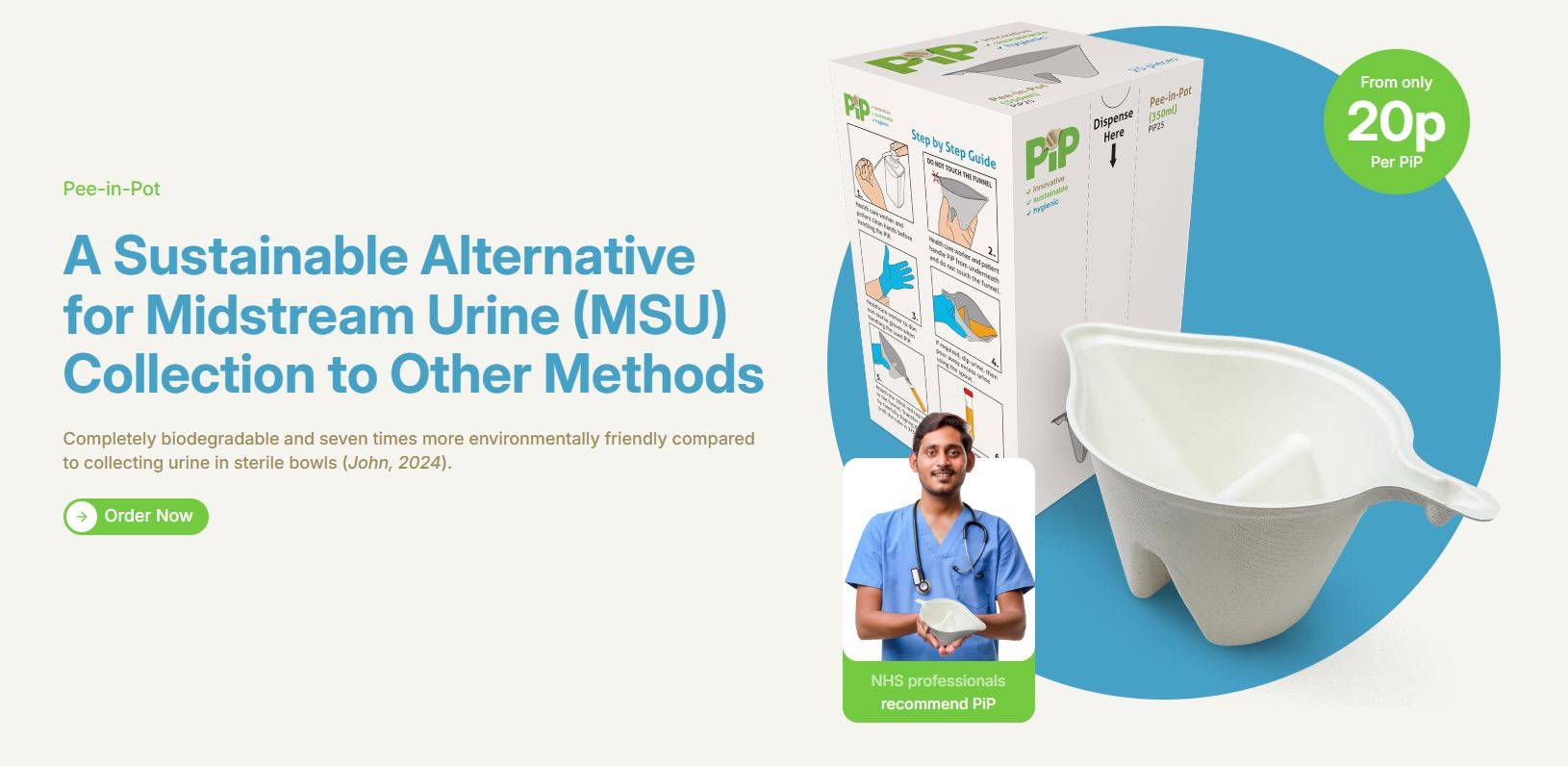The Challenge
Urinary tract infections and related sepsis are one of the most common causes of morbidity and mortality in the United Kingdom. Collection of a midstream urine (MSU) sample for culture is the key diagnostic test for diagnosis and treatment. Despite the importance of urine collection for MSU, urine collection techniques vary widely across different healthcare settings and often use multiple single-use plastic devices.
The NHS contributes around 4.6% of the UK’s greenhouse gas emissions, and globally healthcare contributes about 5% of greenhouse gas emissions. A large contributor is single-use items, particularly plastics.
Innovation
Pee-in-Pot (PiP) is an innovation developed by Somerset NHS Foundation Trust in collaboration with Polyco Healthline.
It was developed and iteratively improved over five years of user testing and product development with clinician and patient feedback.
PiP is a sustainable, single-solution pulp vessel that simplifies mid-stream urine collection while cutting carbon emissions by up to 85%.
The PiP contains an innovative funnel-shaped end, which is designed to snugly fit within and hold a 10ml boric acid tube used for laboratory testing. This allows for urine to be transferred from the PiP without any spillage or need for additional items, such as syringes. The shape of the PiP provides a single-item solution for collection, dipstick testing and decanting.
PiP's composition from bamboo-derived cellulose thermofibre pulp makes it a sustainable alternative to plastic, storing carbon from the atmosphere biogenically and undergoing disposal by maceration and flushing rather than incineration. Its clean but non-sterile nature allows it to be manufactured, packaged and distributed more efficiently.
PiP has the following certifications: Product registration with MHRA, Design rights certificate 6395407 and PAS 29:1999 standard for both the water retention test and the maceration test.
PiP is currently for sale through NHS supply chain at 20.4p + VAT.
In addition to Somerset Foundation Trust rollout, the PiP team are working with four early adopter sites of PiP (all NHS Trusts).

Impact
Carbon Footprint (PiP product)
A cradle to grave carbon foot printing evaluation was performed to compare the PiP with a range of different common urine testing scenarios. Greenhouse Gas Protocol Product Standard guidance was applied. In all modelled scenarios, testing with the PiP produced lower greenhouse gas (GHG) emissions.
Carbon Footprint Reduction Impact (Whole PiP for MSU pathway)
- 78% minimum carbon reduction from a simplified process
- Estimated carbon savings per annum for the NHS of 3 tonnes
- 4 items (3 plastic) removed from the MSU process
- The PiP is flushed via a macerator, up to 4 at any one time rather than incineration
Cost Savings (Based on SFT pathway)
-
Consumables typically used for MSU collection were costed based upon NHS Supply Chain Product Codes: Collection Vessel (3p), 500ml Sterile Bowl Single Use (21p), 30ml Boric Acid Tube (17p), 10ml Syringe (0.6p) , Pipette (0.2p), which totals 38.8p in the best-case scenario (Exc. VAT)
-
The Cost Per PiP is 20.4p + VAT
-
Plastic incineration cost savings based on (grammage weight of the above plastic items) per annum, estimated at £250 per year (per 1,000 in-patient beds)
-
Indirect time savings - shorter and simpler process for the Healthcare Assistant and Medical Laboratory Assistant. Savings across different providers will vary depending on current processes.
Roll out in multiple NHS Sites
In February 2025 the PiP product was added to the NHS Supply Chain Medical Pulp framework and is available for customers to order through the catalogue. NHS supply chain have published a case study on PIP.
Microbiology Safety Study
A detailed comparison has been undertaken of conventional (lean) urine collection processes and compared to the PiP by Mr Joseph John, Urology Clinical Fellow and GIRFT Fellow (Sustainability), that tests the hypothesis that Thermofibre, made from blended bamboo fiber and sugar cane pulp at high temperatures in clean room conditions, is a safe alternative to single-use sterile plastic for collecting mid-stream urine specimens without affecting culture results. The results demonstrated that there was an accepted level of equivalency. It also demonstrated that the PiP produces net carbon savings of between 77-85% across the MSU collection pathway.
Date Published
June 2025

